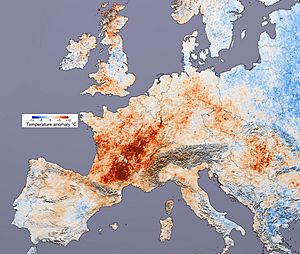Heat wave facts for kids
A heat wave is when the weather gets super hot for a long time. It can also feel very sticky because of high humidity. There isn't one single rule for what counts as a heat wave. What's normal in a hot place might be a heat wave in a cooler area if it's much hotter than usual there. So, it really depends on the normal weather for that spot!
Contents
What is a Heat Wave?
A heat wave is a period of unusually hot weather that lasts for more than a couple of days. It's not just about how hot it gets, but also how long it stays hot. For example, if it's normally 75°F (24°C) where you live, and then it's 95°F (35°C) for a week, that's a heat wave! But if you live somewhere like the desert where 95°F is normal, it wouldn't be called a heat wave.
Why Heat Waves are Different
The idea of a heat wave changes depending on where you are in the world. This is because people and places get used to different temperatures.
- In a cool place, even a few days of warm weather can be a heat wave.
- In a hot place, it needs to be much hotter than usual to be called a heat wave.
This is why scientists and weather experts use local averages to decide if it's a heat wave.
How Heat Waves Form
Heat waves happen when a system of high atmospheric pressure stays in one place for several days or weeks. This high pressure acts like a lid, trapping warm air near the ground. It also stops clouds from forming, so the sun's rays hit the ground directly, making it even hotter. This can lead to very high temperatures that don't cool down much, even at night.
Staying Safe During a Heat Wave
Heat waves can be dangerous, especially for young children, older people, and those with health problems. It's important to know how to stay safe when it's super hot outside.
Tips for Staying Cool
- Drink lots of water: Staying hydrated is super important. Drink water even if you don't feel thirsty. Avoid sugary drinks or too much caffeine.
- Stay indoors: Try to stay in air-conditioned places during the hottest part of the day, usually from 10 AM to 4 PM. If you don't have air conditioning, go to a public library, mall, or community center.
- Wear light clothes: Choose loose-fitting, light-colored clothing. This helps your body stay cool.
- Take cool showers: A cool bath or shower can help lower your body temperature.
- Limit outdoor activities: If you must be outside, try to do it in the early morning or late evening. Take breaks often and find shade.
- Never leave anyone in a car: Cars can heat up very quickly, even with windows cracked open. This is extremely dangerous.
Impacts of Heat Waves
Heat waves can affect many things, from people's health to the environment.
Health Concerns
When it's too hot, your body can struggle to cool itself down. This can lead to:
- Heat exhaustion: You might feel dizzy, tired, or have a headache.
- Heatstroke: This is very serious and needs immediate medical help. Signs include a very high body temperature, confusion, or even passing out.
Environmental Effects
- Drought: Long periods of heat can dry out the land, leading to drought conditions. This means less water for plants, animals, and people.
- Wildfires: Dry conditions make it easier for wildfires to start and spread quickly.
- Energy use: Everyone turns on their air conditioning, which uses a lot of electricity. This can sometimes cause power outages.
Famous Heat Waves
Heat waves have happened all over the world and sometimes cause big problems.
- Europe 2003: A massive heat wave hit Europe in the summer of 2003. It caused many health issues and affected farming.
- Russia 2010: In 2010, Russia experienced a very long and intense heat wave, which led to wildfires and crop damage.
- North America: Many parts of North America have also experienced severe heat waves, especially in recent years.
Scientists are studying how heat waves might change in the future due to global climate changes. Understanding heat waves helps us prepare and stay safe when the temperatures rise.
Images for kids
See also
 In Spanish: Ola de calor para niños
In Spanish: Ola de calor para niños





